Are proxies illegal? It’s a question many people ask when trying to hide their IP address, access blocked websites, or automate online tasks.
While proxies are powerful tools for privacy and freedom, using them the wrong way can get you into legal trouble, fast. The laws aren’t always black and white, and what’s allowed in one country might be a crime in another.
In this guide, we’ll break down when proxies are legal, when they’re not, and how to stay on the safe side. Whether you’re a casual user or a digital pro, these facts matter.
What Is a Proxy Server?
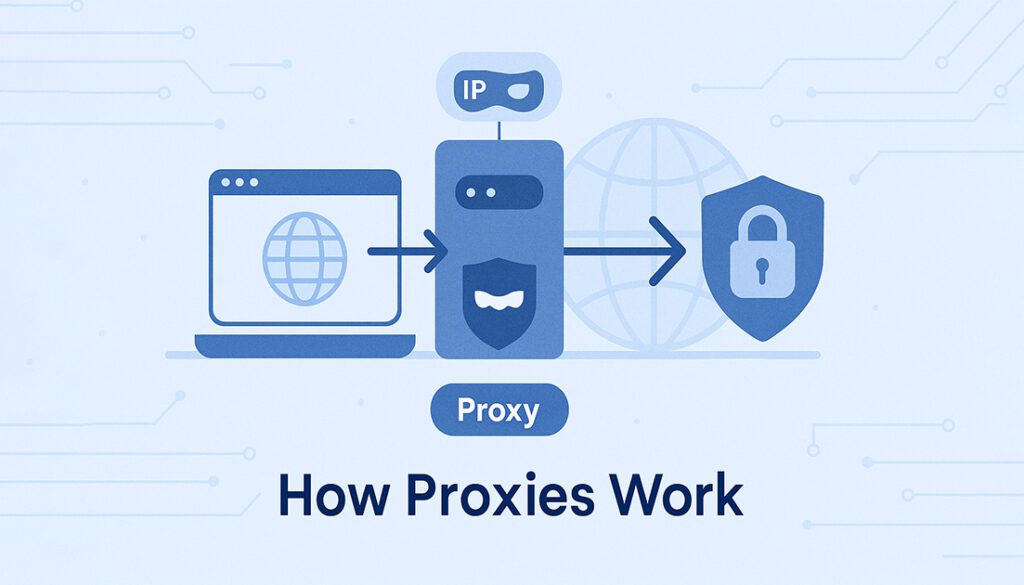
A proxy server works as a middleman between your device and the websites you visit.
Instead of connecting directly to a website, your requests go through the proxy first. This masks your real IP address and gives you a new one, adding a layer of privacy and control.
🧠 What Can a Proxy Do?
- 🛡️ Hide your IP address
- 🌍 Bypass geo-restricted content
- 🔄 Route or filter network traffic
- ⚙️ Speed up access via caching
🧩 Common Proxy Types
- HTTP Proxy – For standard web browsing
- SOCKS Proxy – Works with all types of traffic (apps, torrents, etc.)
- Transparent Proxy – Often used by networks to monitor or restrict traffic
In short, a proxy gives you more flexibility, anonymity, and control online, making it useful for everything from casual browsing to advanced automation..
Are Proxies Legal?
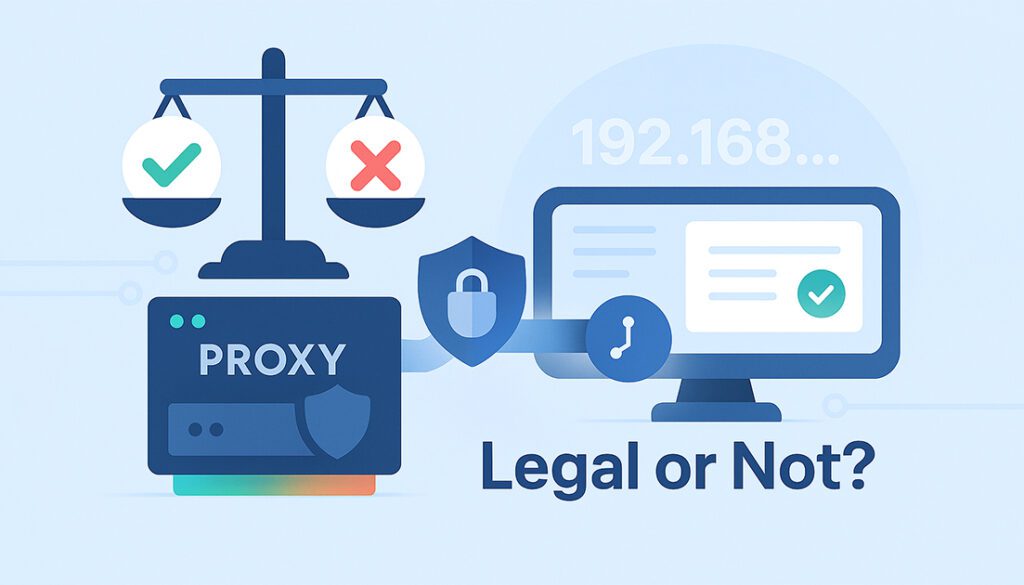
Are proxies illegal? In most cases, no, but it depends on how you use them.
✔️ Legal Uses of Proxies
Proxy servers themselves are legal in many countries. They’re commonly used by:
Businesses
Used for internal network management, content filtering, and cybersecurity policies.
Developers
Helpful in testing location-specific features or running scripts that require IP rotation.
Individuals
Commonly used to enhance privacy, unblock content, or manage multiple online profiles.
🚫 When Proxy Use Becomes Illegal
Breaking the Law
Using proxies for fraud, hacking, or identity theft is illegal and punishable under cybercrime laws.
Accessing Restricted Content
Bypassing copyright locks or accessing banned content through a proxy can lead to legal issues.
Evading Censorship
In countries where proxies are restricted, even simple usage may be considered a violation of local law.
🌍 Country Laws Vary
Some governments (like China or Iran) may ban or regulate proxy use entirely. In those regions, even simple proxy usage could lead to fines or prosecution.
Legal Uses of Proxies
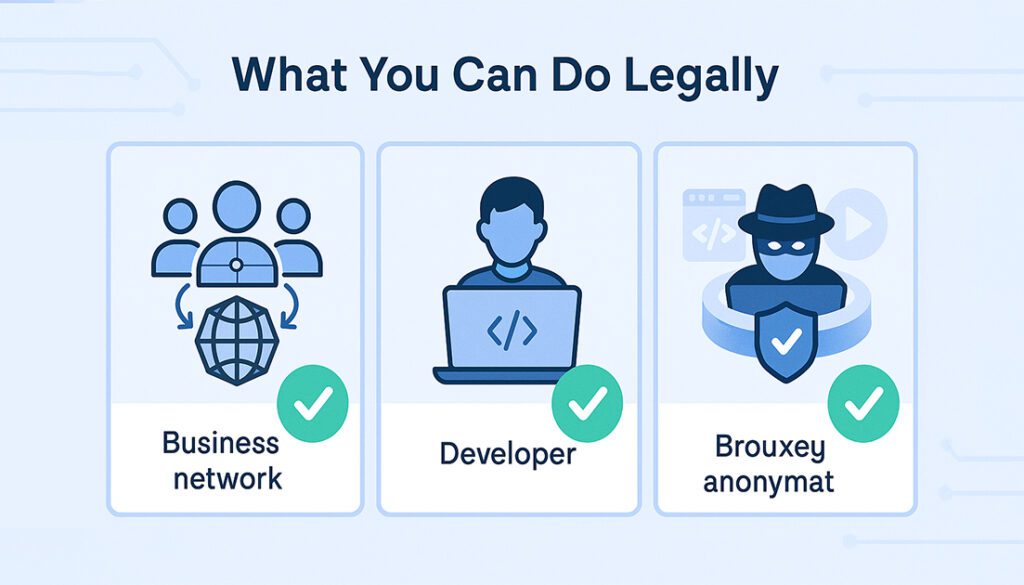
Proxies have plenty of legitimate uses that are perfectly legal and even encouraged in many industries. Here are the most common:
✅ Legal & Ethical Ways to Use Proxies
- 🛡️ Privacy Protection
Mask your IP address to browse without tracking or surveillance. - 🌍 Bypassing Geo-Restrictions
Access content or websites that are limited by region (e.g., streaming services, blocked news). - 🔍 SEO & Marketing Research
Run keyword rank tracking, competitor research, and ad verification safely at scale. - 🧪 Testing Apps & Websites
Developers use proxies to simulate different locations or test user behavior. - 🖥️ Managing Social Media or Accounts
Marketers and eCommerce sellers use proxies to manage multiple accounts without bans. - 🧱 Network Security & Filtering
Organizations use proxies to filter content, control access, or log employee internet usage.
As long as you’re not violating terms of service, laws, or rights of others, using a proxy server for these purposes is fully legal and widely accepted.
Illegal Uses of Proxies
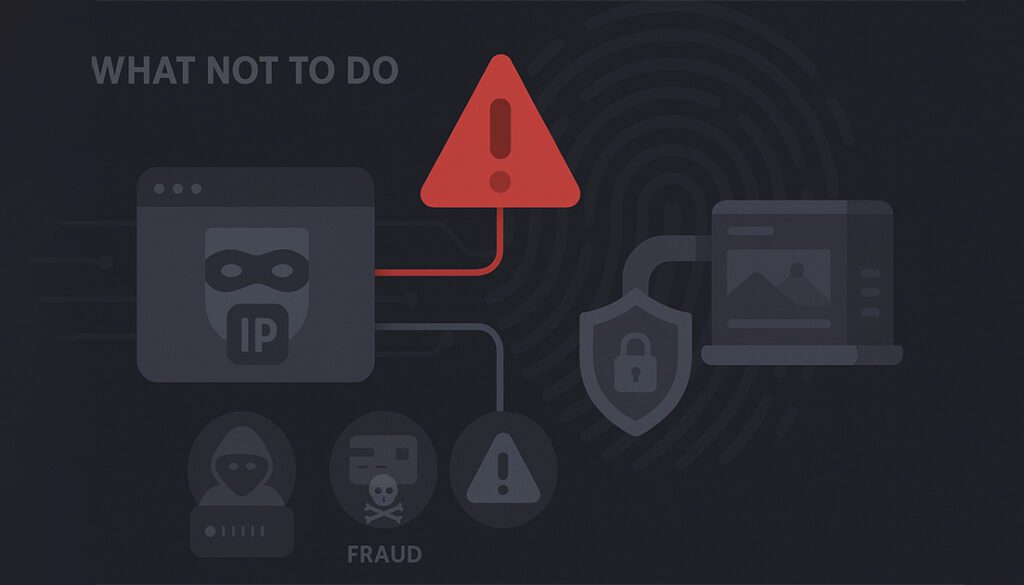
While proxies are legal tools, they can quickly become part of illegal activity if used irresponsibly. What matters most is intent.
🚫 Common Illegal Uses of Proxies
- Fraud or Scams
Using proxies to impersonate users, create fake accounts, or conduct financial fraud. - Hacking or Cyberattacks
Masking IPs to launch DDoS attacks, steal data, or break into systems. - Bypassing Platform Bans
Violating terms of service by rejoining websites after suspension or ban. - Scraping Prohibited Content
Automating data scraping from sites that clearly prohibit it in their terms. - Accessing Illegal or Restricted Content
Using proxies to view banned materials or enter blocked sections of the internet.
These actions can lead to account bans, IP blacklisting, civil penalties, or even criminal charges depending on severity and jurisdiction.
⚠️ Remember
Just because you’re using a proxy doesn’t mean you’re invisible or immune from responsibility.
Country-Specific Proxy Laws
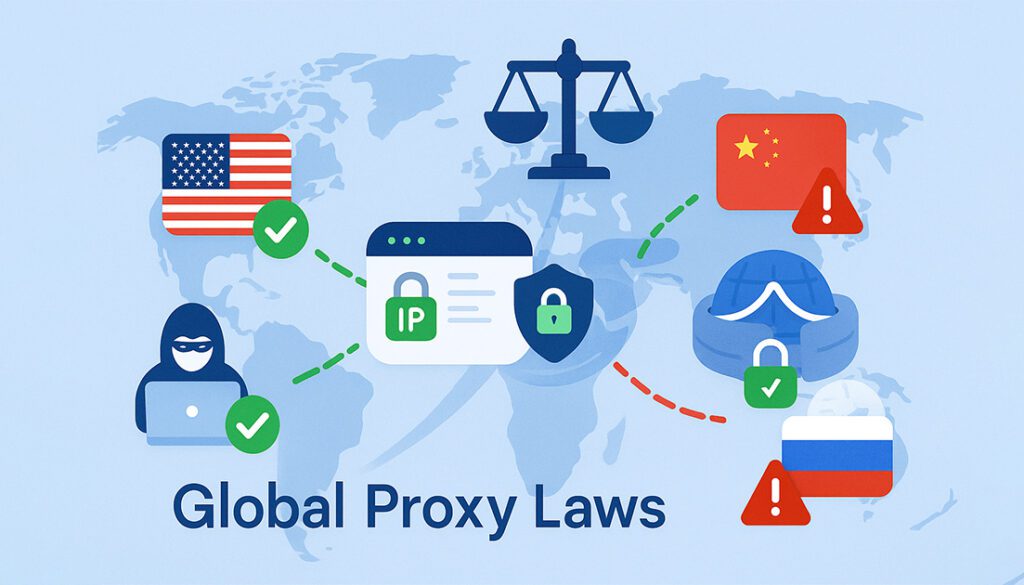
Proxy legality isn’t the same everywhere. Some countries allow proxy use freely, while others strictly regulate or even ban them.
🌍 Countries Where Proxies Are Generally Legal
- 🇺🇸 United States – Legal to use, unless tied to illegal activity
- 🇬🇧 United Kingdom – Allowed for privacy and research
- 🇩🇪 Germany – Permitted, but data collection is heavily regulated
- 🇯🇵 Japan – No ban on proxies for personal or commercial use
🚫 Countries with Restrictions or Bans
- 🇨🇳 China – Most proxies are blocked; unauthorized use can be penalized
- 🇮🇷 Iran – Proxies often used to bypass censorship, which is illegal
- 🇷🇺 Russia – Requires registration; non-compliant proxies are banned
- 🇹🇷 Turkey – Actively blocks many proxy services and VPNs
If you’re traveling or operating internationally, make sure to check local laws before setting up or using a proxy server. Penalties can include blocked access, fines, or even prosecution in more authoritarian regions.
Risks of Using Proxies
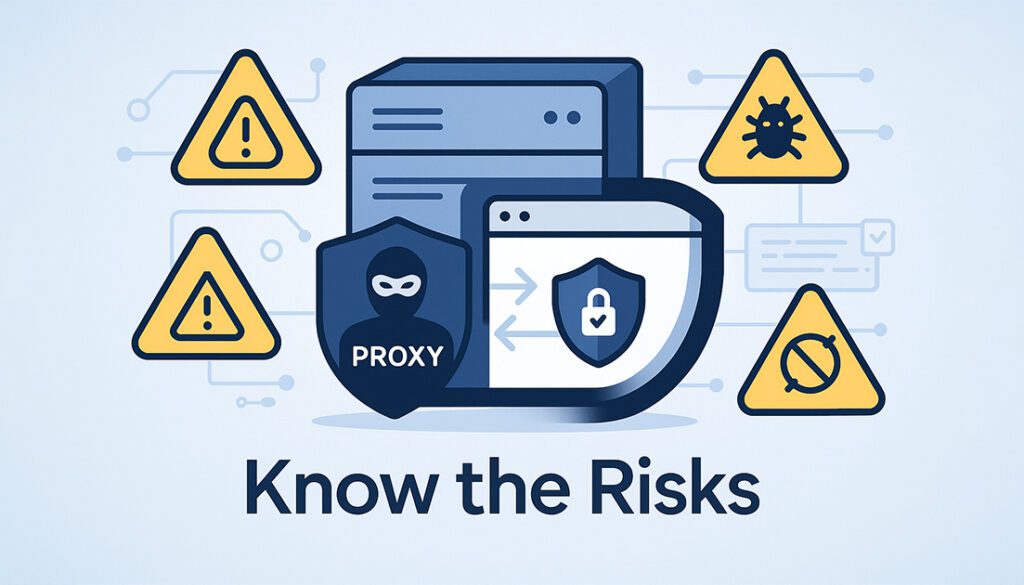
Even if you’re using proxies legally, there are still risks to be aware of, especially with free or unreliable services.
⚠️ Common Proxy Risks
- Data Leaks – Some proxies log your traffic or expose your personal data.
- Security Vulnerabilities – Free proxies may inject ads, malware, or trackers.
- Performance Issues – Many public proxies are slow, unstable, or overloaded.
- False Sense of Anonymity – Proxies hide your IP, but they don’t encrypt your traffic like a VPN.
To minimize risk, choose a trusted provider, avoid free proxy lists, and never transmit sensitive information over an unsecured proxy.
Frequently Asked Questions
Are proxies illegal?
No, proxies are legal in most countries when used for legitimate purposes. However, using them to commit crimes, bypass laws, or violate terms of service can still be illegal.
Is it legal to use a proxy for Netflix or streaming?
Using a proxy to access geo-blocked content may violate the platform’s terms of service, but it’s typically not illegal. Still, your account could be restricted or blocked.
Can I get in trouble for using a free proxy?
If the proxy logs data or is linked to illegal activities, it could expose you to privacy breaches or even legal issues depending on your usage.
Are proxies banned in some countries?
Yes. Countries like China, Iran, and Russia heavily restrict or ban unauthorized proxy use. Always check local laws before using one.
What’s the difference between a proxy and a VPN legally?
Proxies and VPNs serve similar purposes but VPNs provide encryption. Both are legal in many countries, but VPNs may be more restricted in censorship-heavy regions.
Can businesses legally use proxies?
Absolutely. Companies use proxies for content testing, SEO, filtering, and cybersecurity, fully legal as long as it aligns with business regulations.
Will using a proxy hide illegal activity?
No. While proxies can mask your IP, they don’t make you invisible or exempt from consequences. Authorities can still trace illegal activity through other means.
Conclusion
Proxy servers aren’t illegal, but how you use them matters.
They’re powerful tools for privacy, access, and control, and totally legal in most countries when used responsibly. But misuse can carry serious consequences.
If you plan to use a proxy, stay informed, stay compliant, and always choose trusted tools to avoid risks.
Looking for a Safe and Legal Proxy?
Don’t risk your privacy or break the law. Browse our top-rated proxy providers trusted by professionals for security, compliance, and performance.
Explore Proxy Reviews

